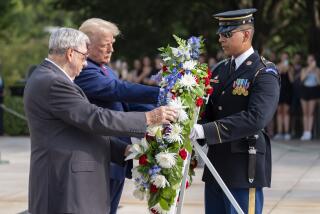Official Blamed for ‘Shameful’ U.S. Cemetery
- Share via
U.S. Rep. Harley Staggers (D-W. Va.) said Saturday that the blame rests “directly on the shoulders” of the nation’s secretary of veterans’ affairs for the “shameful” conditions found in March at Riverside National Cemetery.
His remarks came after viewing photographs that showed almost 800 collapsed graves and scores of listing headstones at the nation’s second-busiest cemetery.
Secretary Edward J. Derwinski “simply hadn’t asked for the money (needed for cemetery repairs), even though they knew there was a problem,” Staggers said during a break in hearings that his subcommittee on housing and memorial affairs held Saturday at the Veterans Administration complex in Westwood.
Staggers said the damage at Riverside after this spring’s heavy rains emphasizes deficiencies at veterans’ cemeteries nationwide.
“It is beyond me how the Administration can choose not to propose adequate funding for our national cemeteries when shameful conditions like those in Riverside exist,” he said.
Therese Bush, director of the cemetery in Riverside, says that she has been struggling to keep up with maintenance since the federal government trimmed her budget from $2.6 million in 1989 to $2.17 million this year.
According to Staggers, the White House Office of Management and Budget has proposed trimming the VA’s cemetery budget request for fiscal 1992 by $11 million. Staggers’ Committee on Veterans Affairs has recommended restoration of that amount.
The congressman complimented Bush on Saturday for doing the best she could and said he “felt sorry for her” for having to make do with a limited budget.
But Bill Keene--the World War II veteran who brought the problems at Riverside to public attention--said he thought she should accept “at least part of the responsibility” for what he found there last March.
Keene said that when he and his late wife, Evelyn, first viewed the cemetery from a nearby road several years ago, “it looked pretty good” and they decided that they both wished to be buried there.
He said both of them qualified for burial in a national cemetery because of their service in Europe--they met when she, an Army nurse, treated him, an infantry lieutenant, for mess hall food poisoning.
Keene, who lives in Huntington Beach, said that when his wife died in June, he arranged for a graveside funeral at the cemetery.
“It was pretty rinky-dink,” he said Saturday. “They played ‘Taps’ on a tape recorder.”
Keene said that when he visited the grave in March, he found it in the middle of a quagmire pockmarked by sinking graves. Much of the area was devoid of ground cover except for a few weeds.
“I wouldn’t want a dog to be buried in that dirty, vacant lot,” Keene said.
Anthony Principi, deputy secretary of veterans affairs, ordered $300,000 in emergency funding from the Department of Veterans Affairs Budget to repair the graves and spruce up the place.
“Our response was quick, decisive and effective,” Roger Rapp, a director of field operations for the department, testified Saturday. “By Memorial Day, Riverside National Cemetery will once again reflect the national cemetery system’s high standards for maintenance.”
“It looks better, now,” Keene said.
Also at Saturday’s hearing, a homeless advocate alleged that property owned by the VA complex in West Los Angeles is being leased to groups with no tie to veterans. In written remarks, Toni Reinis of the California Homeless and Housing Coalition said VA Director William K. Anderson is responsible.
“Instead of addressing the problems of homeless veterans, Mr. Anderson has spent his time assisting a private interest group in the pursuit of the development of a $20-million park preserve,” she stated. Anderson defended the varied use of VA land. “Every use has a benefit coming back to the VA,” he said.
Associated Press contributed to this story
More to Read
Get the L.A. Times Politics newsletter
Deeply reported insights into legislation, politics and policy from Sacramento, Washington and beyond. In your inbox twice per week.
You may occasionally receive promotional content from the Los Angeles Times.










